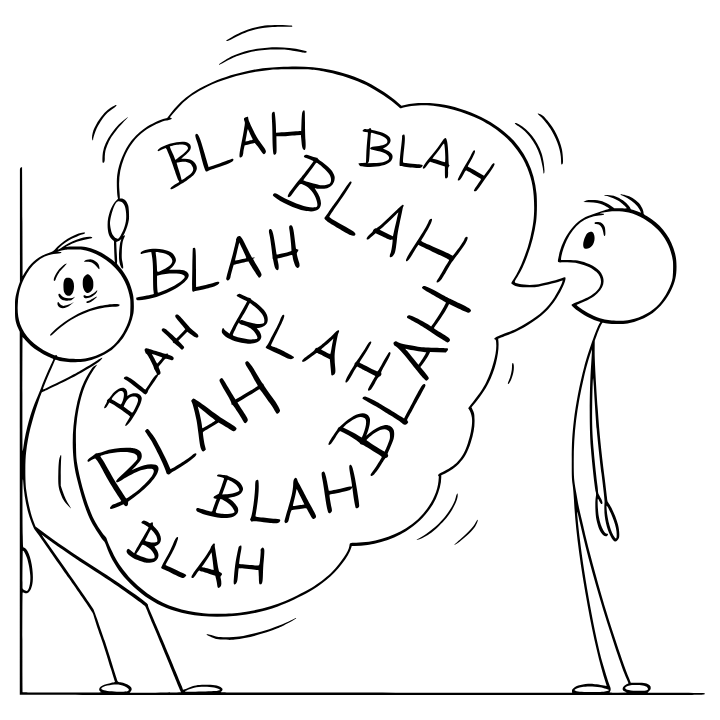Can we please, PLEASE stop using hyperbolic phrases in politics and business?
I’ve been listening to UK politicians this year and honestly, it’s like listening to a bunch of estate agents describing a studio flat as “a bijou property with infinite potential.”
Just in the first half of 2025, we’ve had:
- “Britain will be one of the great AI superpowers” – Keir Starmer (January 2025)
- “Making Britain a clean energy superpower” – ongoing government rhetoric
- “The UK’s future as a global scientific superpower” – Oxford-Cambridge conferences
- Making Britain a “clean energy superpower” – Labour’s election promises

Credit: Joanna Aitkens
Look, I’m all for ambition, but calling yourself a “superpower” is like me declaring my corner shop is a “global retail empire.”
It’s not confidence – it’s copywriting that’s lost touch with reality.
Here’s why this language is terrible:
It sets impossible expectations – like promising someone they’ll become a supermodel when they sign up for a gym membership. Imagine if I promised every new client that working with me would make them “a global marketing superpower.” You’d quite rightly think I’d lost my mind. Yet this is exactly what politicians do when they promise superpower status across multiple sectors simultaneously.
As the great advertising pioneer David Ogilvy once said: “The consumer isn’t a moron; she is your wife.” Politicians seem to have forgotten this wisdom entirely.
- It sounds completely detached – When people can’t afford heating bills, being told you’re an “energy superpower” feels like your landlord bragging about their property empire whilst you’re sat in the cold with a broken boiler.
- It’s lazy speechwriting – “Superpower” is the political equivalent of using “amazing” to describe everything from your morning coffee to the Northern Lights. Winston Churchill, arguably Britain’s greatest political communicator, understood this perfectly. His most memorable phrases – “We shall never surrender,” “Blood, toil, tears and sweat” – were powerful precisely because they were specific, honest, and grounded in reality.
- It creates credibility gaps when experts say “Britain is no longer a global superpower” whilst politicians claim we’re about to become one in five different sectors.
It Destroys Trust Through Repetitive Failure
The most damaging effect of political hyperbole is cumulative. When politicians repeatedly promise to be “world beating” and consistently fail to deliver, they erode public trust in institutions themselves. Research from the Institute for Government shows that the gap between promise and delivery has become a defining characteristic of British politics, contributing to voter disillusionment and democratic dysfunction.
Research from Stanford University shows that stories are remembered up to 22 times more than facts alone. But when your story contradicts observable reality, you create cognitive dissonance. People stop believing anything you say.
The Psychology of Political Overstatement
 There’s actually fascinating research behind why politicians gravitate towards hyperbole. A 2019 study published in the Journal of Experimental Social Psychology found that people tend to view confident overstatement as a sign of competence – initially. However, this effect rapidly reverses when the claims prove unfounded.
There’s actually fascinating research behind why politicians gravitate towards hyperbole. A 2019 study published in the Journal of Experimental Social Psychology found that people tend to view confident overstatement as a sign of competence – initially. However, this effect rapidly reverses when the claims prove unfounded.
Dr. Jennifer Aaker from Stanford Graduate School of Business notes: “Authenticity is the new authority.” In our hyper-connected world, audiences quickly spot the gap between promise and delivery.
Better copywriting would be:
❌ “We’ll be an AI superpower”
✅ “We’re investing £47bn to become a leading AI hub”
❌ “Clean energy superpower”
✅ “We’re building the infrastructure for energy independence”
Your customers are smart. They’ve heard politicians promise the moon and deliver a handful of dust. Don’t make the same mistake in your marketing. As copywriters and marketers, we know that trust is built through honesty, not hyperbole. Political communications could learn from good marketing: promise what you can deliver, then over-deliver on what you promised.
The Churchill Standard
Let’s return to Churchill for a moment. When Britain faced its darkest hour, he didn’t promise to make the country a “military superpower” or a “diplomatic superpower.” Instead, he offered something far more powerful: honest leadership and specific, achievable goals. “I have nothing to offer but blood, toil, tears and sweat,” he said. Not hyperbole – honesty. And it worked because people could see the truth of it.
The most powerful copy isn’t the loudest – it’s the most believable.
Moving Forward
The irony is that Britain actually has remarkable achievements to celebrate. We’re Number three in the world for private AI investment and have increased renewable energy capacity fivefold since 2010, between 2010-2022 (even if it’s slowed down more recently). These are genuine accomplishments worth shouting about.
But instead of building on real successes with credible next steps, politicians reach for the superlative every time. It’s like a restaurant calling itself “The World’s Greatest” when “The Best Fish and Chips in Birmingham” would be both more believable and more useful.
The Copywriting Lesson
Whether you’re writing for politics or business, the principle remains the same: trust is built through honesty, not hyperbole. The most powerful copy isn’t the loudest – it’s the most believable.
Your audience – whether voters or customers – aren’t looking for impossible promises. They’re looking for someone who understands their problems and offers realistic solutions.
As Maya Angelou wisely observed: “Words mean more than what is set down on paper. It takes the human voice to infuse them with deeper meaning.”
Perhaps it’s time our politicians – and all of us in the communication business – remembered that lesson.
What hyperbolic phrases make you cringe?
– And yes, if there are any politicians out there who want a chat about how to communicate more authentically, message me!
- Tips like these are included in my book ‘The Small Business Guide to Writing Powerful Website Copy‘, available on Amazon
